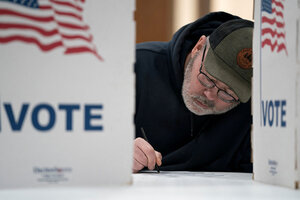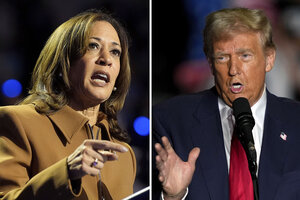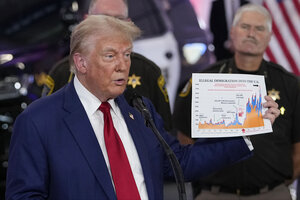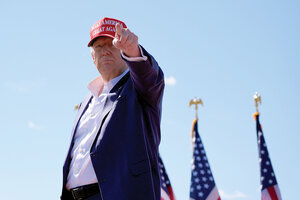For many Republicans, Trump’s near miss signals ‘God is involved’
Loading...
| Milwaukee
As former President Donald Trump prepared to enter the Republican National Convention for the first time on Monday after surviving a shocking weekend assassination attempt, his friend and country singer Lee Greenwood invoked a higher power.
“Prayer works! ... The bullet missed him just enough to save his life – to be the next president of the United States,” Mr. Greenwood told the crowd, as Mr. Trump waited just off the convention floor. “We have believed for so long that God will make some changes in this country. And He’s about to make a change to the current administration and send them home.”
Mr. Greenwood then launched into his familiar hit “God Bless the U.S.A.” as the former president entered the arena to thunderous applause. The crowd broke into “USA! USA!” before switching to the words Mr. Trump himself mouthed as he was rushed off the stage after a bullet grazed his ear last Saturday: “Fight! Fight! Fight!”
Why We Wrote This
Donald Trump’s survival of a would-be assassin’s bullet is a sign of God’s hand at work, many Republicans say – a belief in a divine purpose that raises the existential stakes of the campaign.
The moment was cathartic. And Mr. Greenwood’s suggestion – that Mr. Trump was saved by God so that he can recapture the White House – has been a consistent theme throughout the week here, with Republican officials and delegates alike painting their bloodied but unbowed leader as a hero of near-biblical proportions.
Plenty of people from across the political spectrum invoked God in expressing gratitude for Mr. Trump’s survival. President Joe Biden said he was keeping Mr. Trump and family in his prayers. Former House Speaker Nancy Pelosi posted, “Thank God that former President Trump is safe.”
But for some fervent Trump supporters, his survival signals not only God’s protection but also a larger, divinely ordained plan to return him to the Oval Office. In primetime speeches and conversations on the convention floor, many here describe it as part of a broader good-versus-evil struggle encapsulated in the election, further raising the existential stakes of the race.
“Not even an assassin’s bullet could stop him,” Arkansas Gov. Sarah Huckabee Sanders, Mr. Trump’s former White House press secretary, declared during her Tuesday night speech. “God Almighty intervened because America is one nation under God and He is certainly not finished with President Trump.”
“How many millions have seen the grace of the president turning his head at the right time and how the bullet grazed him as opposed to kill[ing] him? People are saying, ‘You know what? There’s something going on here,’” says Jim Kasper, a North Dakota state representative and delegate. “I think Saturday was a defining moment in our nation’s history, and I think that event will go down in the history books as maybe the event that changed the course of a nation.”
A base anchored in white evangelical Protestants
Christian language and imagery has infused Republican presidential politics for decades, ever since Ronald Reagan brought white Evangelicals into the GOP fold. In 2020, Mr. Trump won 84% of the white evangelical Protestant vote, according to the Pew Research Center’s validated voter survey, up from 77% in 2016. That group makes up about one-fifth of the total U.S. population and represents a huge chunk of Mr. Trump’s most dedicated base.
And many Trump backers have long embraced a link between their faith and support for the former president. T-shirts for sale outside the convention hall and worn by attendees here in Milwaukee include slogans like “God, guns & Trump” and “Jesus is my savior. Trump is my president.”
Ralph Reed, a longtime leader on the religious right, bristles at the idea that there’s something explicitly messianic about the way supporters have been talking about the president.
“People don’t view anyone, including President Trump, in messianic terms. They already have a Messiah – and his name is Jesus Christ. What they do believe is that God uses human beings to accomplish his purposes,” he says, before ticking off policies where Mr. Trump had supported the religious right.
“We’re extremely grateful to God for sparing his life and sparing our country from an unspeakable tragedy,” Mr. Reed adds. “What it holds for the future, I don’t know. I’m not a prophet.”
Likewise, Gary Bauer, a longtime conservative evangelical leader and 2000 Republican presidential candidate, says that while many Christians may be interpreting the assassination attempt as “further evidence of God wanting this particular man to continue to live,” he didn’t think that meant that the election was settled in Mr. Trump’s favor.
“It obviously isn’t saying that Jesus is a Republican. He clearly isn’t,” he says. “But it is a way of saying that God is involved in the affairs of man. And millions of us continue to believe that God had a hand in the founding of America – and that without His hand of protection, America is in deep trouble.”
Yet as the assassination attempt has enhanced the former president’s status with supporters, the resulting rhetoric is alarming some researchers who follow Christian nationalism.
“It is pretty striking the extent to which Trump’s survival of this horrible assassination attempt is being viewed in very religious, almost apocalyptic, terms,” said Melissa Deckman, CEO of the Public Religion Research Institute.
Her organization conducted polling with the Brookings Institution last year that found about 10% of Americans are Christian nationalist adherents, and another 20% are sympathetic to those views. More than half of white Evangelicals expressed Christian nationalist views in her survey. Among adherents, 84% agreed with the statement “If the U.S. moves away from our Christian foundations, we will not have a country anymore.”
The overtly religious language at this week’s convention has at times been paired not with calls for national unity but with an us-versus-them attitude, directly linking the assassination attempt – perpetrated by a young man whose motives and political views remain unclear – to Democratic campaign rhetoric attacking Mr. Trump.
“My thoughts immediately turn to the book of Isaiah, that says, ‘No weapon formed against you shall prosper,’” Ben Carson, a former Trump Cabinet member, said in his speech. “Let me tell you the weapons that they use. First they tried to ruin his reputation, and he’s more popular now than ever. And then tried to bankrupt him, and he’s got more money now than he had before. And then they tried to put him in prison, and he’s freer and has made other people free with him. And then last weekend, they tried to kill him. And there he is over there, alive and well.”
Some experts worry that the failed assassination attempt, combined with Republicans’ burgeoning optimism about Mr. Trump’s chances of victory, has raised the stakes for the fall election – win or lose.
“I think it will be fuel for retribution, revenge, taking off the gloves, so to speak, and pursuing political enemies and anyone who stands in Trump’s way in a manner that will be considered just and divine retribution, and part of God’s plan,” said Brad Onishi, a former Christian nationalist who studies the movement as a professor at the University of San Francisco.
Many pro-Trump rioters who attacked the U.S. Capitol on Jan. 6, 2021, to try to overturn his election loss expressed explicitly Christian nationalist viewpoints or displayed symbols of the movement. Those who breached the Senate chamber, for instance, stopped to pray together on the floor.
A defender of the Christian faith
The tone at the convention has been especially notable given that Mr. Trump actually pushed the party to soften its positions on some social issues dear to the religious right – taking out the GOP’s long-held official stance in the party platform opposing same-sex marriage and watering down its language on abortion.
Mr. Trump reportedly claimed God backed the party when he called in to a convention meeting last week to lobby hesitant religious conservatives to back the new platform. “We are going to win because we have right on our side. We have good on our side. I think, frankly, we have God on our side,” Mr. Trump said, according to The Washington Post.
That’s far from the first time Mr. Trump, who rarely attends church and isn’t known for being particularly devout, has claimed the mantle of defender of the Christian faith. But he’s increasingly leaned into that idea during this campaign.
A video Mr. Trump has shared on social media and played at some rallies makes this clear. “On June 14, 1946, God looked down on his planned paradise and said, ‘I need a caretaker.’ So God gave us Trump,” the video’s narrator intones.
Speaking to a convention of Christian broadcasters in February, Mr. Trump accused those on the left of trying to stamp out Christianity. “They want to tear down crosses where they can, and cover them up with social justice flags,” Mr. Trump said. “But no one will be touching the cross of Christ under the Trump administration, I swear to you.”
Mr. Trump is even selling his own edition of the Bible – a King James version he produced with Mr. Greenwood that also features the U.S. Constitution and other founding documents.
“All Americans need a Bible in their home, and I have many – it’s my favorite book,” Mr. Trump said in the promotional ad, surrounded by American flags and gripping the Bible. “We have to bring Christianity back into our lives and back into what will be again a great nation. ... We must make America pray again.”
Mr. Bauer, the evangelical leader, who runs the advocacy group American Values, says in a phone interview that religious voters’ reaction to Mr. Trump’s near-assassination fits with historical precedent.
“We [Americans] have a long history of believing, particularly Christians believing, that the God of the Bible had His hand on our country,” Mr. Bauer says, pointing to George Washington crediting God’s providence for America’s victory in the Revolutionary War in his first inaugural address. Many Americans also saw it as a divine sign when both John Adams and Thomas Jefferson died on the Fourth of July, 50 years to the day after the Declaration of Independence was officially approved.
When President Reagan survived an assassination attempt in 1981, the president believed deeply that he’d survived “because God had something else for him to do,” says Mr. Bauer, who worked in the Reagan administration. “And he concluded that “something else” was to bring down Soviet communism.”
Whether driven by cynical political calculation or a sincere shift in views, Mr. Trump is now expressing a similar sentiment.
“God was with me, I tell you,” Mr. Trump said at a Wednesday private event. “In many ways that changes your attitude, your viewpoint on life. And I think honestly, you appreciate God even more, I really do. Because something happened.”
Staff writer Story Hinckley contributed to this report.
Editor's note: A reference to the Declaration of Independence has been corrected to reflect that July 4 was the date of official approval.

















